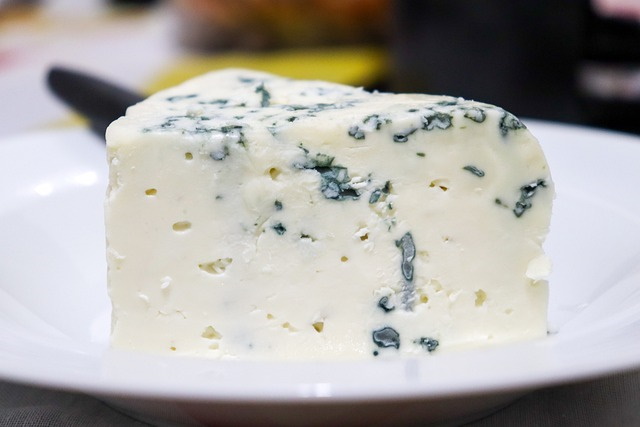
Creating wine and cheese pairings is a nuanced art that requires an in-depth understanding of complementary flavors. It’s challenging, but a good pairing is well worth the effort.
When it comes to blue cheese, finding a suitable wine can be a touch more difficult. This pungent cheese features strong flavors that can clash severely with many wines. While you can always use classic go-tos like intense reds or sweet dessert wines, they’re not the only options you have. In this article, you’ll learn some of the best wine and cheese pairings for blue cheese, as well as some additional tips for creating delicious blue cheese wine pairings.
The Best Wine and Blue Cheese Pairings
There are a variety of different types of blue cheese, such as Stilton, Roquefort, and Gorgonzola. These cheeses come from different animals and have a range of textures.
No matter what type of blue cheese you choose, they all have one thing in common – makers introduce a strain of penicillin into them before shaping them. Mold develops as the cheese ages, creating the blue veins that run through the cheese along with the cheese’s signature aroma and flavor.
When it comes to blue cheese, fortified and dessert wines are the varieties most people turn to for their wine and cheese pairings. The good news is that, while they’re excellent choices, they’re not your only options. Here are a few wines to consider the next time you’re in the mood for blue cheese.
1. Port
Port is one of the most common wines to pair with blue cheese – Stilton, in particular. You can pair it with other types of blue as well. The intensity of Port makes it a good match for the pungent flavors of many blues.
When it comes to Port, you have two options – vintage and tawny. Vintage Ports are more intense, making them a popular choice. Tawny Ports are more mellow (due to their aging process), featuring notes of nuts and wood. These characteristics create the perfect backdrop to highlight the flavor of a good blue cheese.
2. Sherry
Sherry is another type of fortified wine with a strong flavor profile. Like Port, the sweetness of the wine works well with the pungency of the cheese. Don’t be afraid to experiment by mixing and matching other fortified wines with different types of blue cheeses to create unique combinations.
3. Malbec
Malbec is a medium to full-bodied red with notes of dark fruits (such as blackberries and plums), cocoa, and leather. This distinctive flavor profile makes it a great partner for blue cheese. Malbecs that undergo oak aging also feature hints of tobacco. The complex flavors of blue cheese don’t overwhelm the wine. Instead, they marry together beautifully. A Malbec is a particularly suitable choice if you’re eating blue cheese as part of a meal rather than on its own.
4. Cabernet Sauvignon
Cabernet Sauvignon is another medium to full-bodied red option. While it shares some similarities to Malbec, it does feature stronger tannins, making it the more intense of the two. It’s also a particularly good option for stronger blue cheeses like Roquefort. If you pair Cabernet Sauvignon with a milder blue, you might lose some of the more subtle notes of the cheese.
5. Sauternes
Here’s something that might surprise you: You don’t always need to choose a red wine to go with blue cheese. Some white wines make for a great pairing, too. One excellent option to consider is Sauternes. This sweet, white dessert wine features notes of peaches, apricots, and honey with a touch of nuttiness. There’s such a strong contrast between the wine and the cheese that they end up working very well together. One of the best combinations to try is Sauternes with Roquefort.
6. Chardonnay
If you’re looking for a wine that you can serve with other courses in a meal (or a meal that includes a blue cheese sauce), you might consider an oaked Chardonnay. This wine pairs particularly well with Stilton blue cheeses. The oakiness brings out the nutty, creamy characteristics of the cheese, while the melon and citrus flavors create a nuanced backdrop.
7. Prosecco
While Prosecco works well with certain blues, this sparkling wine can’t quite stand up to more intense flavors. It can, however, pair quite nicely with some of the milder options like creamy Gorgonzolas. The lightness of the wine helps highlight the sharpness of the cheese and bring out its more subtle flavors.
Additional Blue Cheese and Wine Pairing Tips
Creating a delicious blue cheese wine pairing is an art form, but it’s far from impossible. Here are a few tips to keep in mind:
- Consider the type of milk used to create the cheese (cow’s, goat’s, or sheep’s milk)
- Pay attention to the texture of the cheese (creamy, dry, crumbly)
- Consider the strength of the cheese (bolder cheeses typically need a bolder wine)
- Take the way you’re serving the cheese into consideration (by itself or as part of a larger meal)
Enjoy Incredible Wine and Cheese Pairings for All Occasions
For those that love blue cheese, wine options can feel limited. Fortunately, you have more options than just intense reds and dessert wines. Hopefully, these wine cheese pairing tips provide you with some inspiration.
Are you looking for a quality wine to accompany your favorite blue cheese? JJ Buckley Fine Wines has the perfect bottle for you. Feel free to browse our online selection or consult with our wine specialists to find exactly what you need.